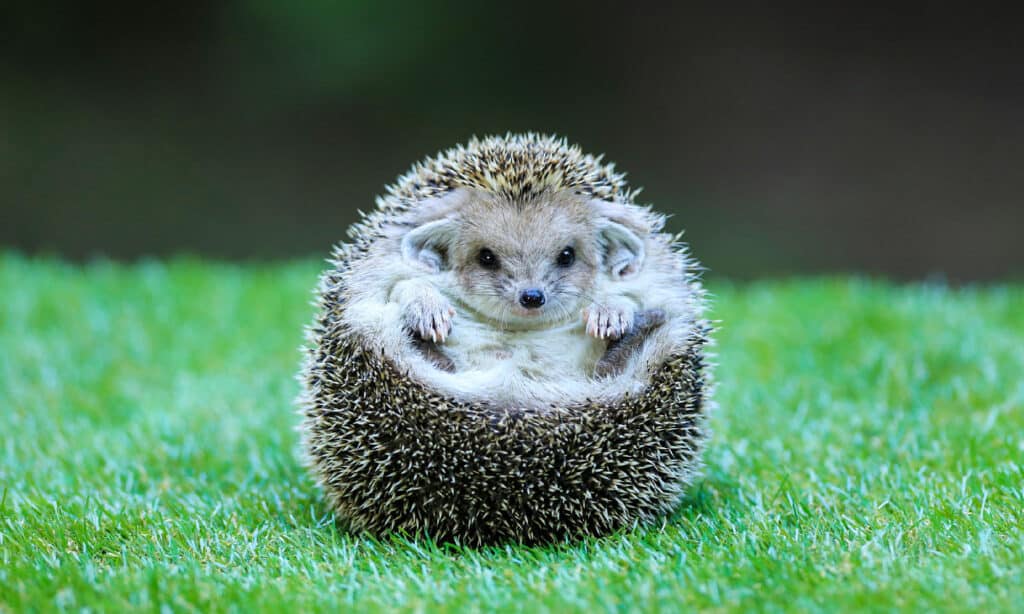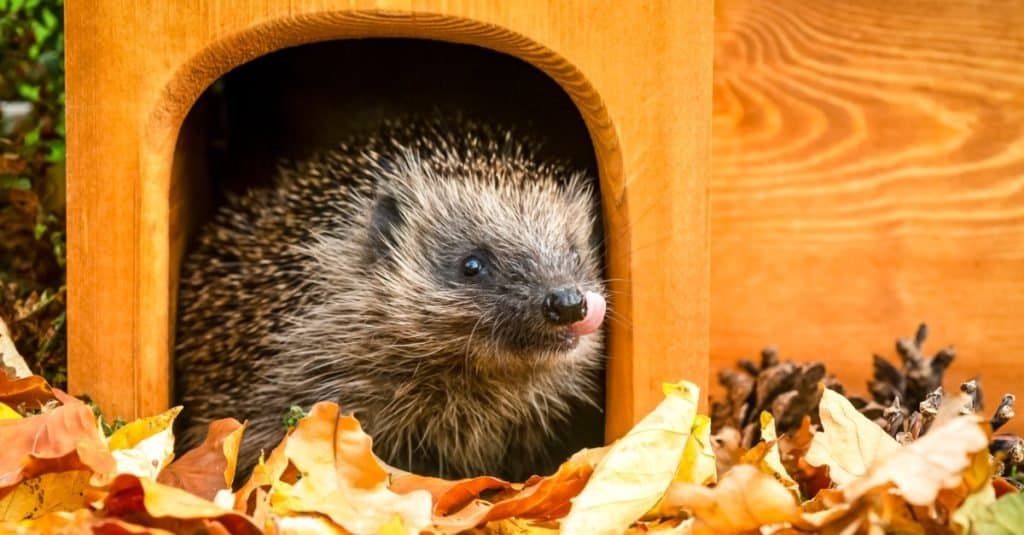Do hedgehogs make good pets? They’re small and they’re cute, but those aren’t the only relevant factors. Hedgehogs have several specific needs that have to be met for them to be happy and healthy. Read on to discover the pros and cons of hedgehog ownership and decide whether this pocket pet is right for you!
What Are Hedgehogs?

There are 17 species of hedgehogs, none of which are native to North America.
©Anne Coatesy/iStock via Getty Images
Hedgehogs are any of 17 species of spiny mammals divided into five genera within the subfamily Erinaceinae. They are native to Europe, Asia, and Africa and have also been introduced to New Zealand. There are no extant species of hedgehogs native to North America. These small mammals are distantly related to shrews and bear a close resemblance to the porcupine. Two hedgehog species in particular have become common as pets: the European hedgehog (Erinaceus europaeus) and the African pygmy hedgehog (Atelerix albiventris).
Do Hedgehogs Make Good Pets?
Whether or not a hedgehog makes a good pet depends largely on the level of care the owner can provide. Below you will find a list of pros and cons to help you decide if this is a suitable pet for you, which includes considerations like the typical hedgehog’s temperament and habits. For a more detailed discussion of hedgehog care, see the next section titled “Caring for a Hedgehog.”
Do Hedgehogs Make Good Pets?: Pros

Hedgehogs make adorable, compact pets.
©yul38885 yul38885/iStock via Getty Images
Here are a few pros of keeping hedgehogs as pets:
- They’re small and compact: Because hedgehogs are compact animals, they typically don’t need as much space as a larger pet. That said, it’s important not to cramp them just because they’re small. Hedgehogs like to roam around and get a lot of exercise.
- They’re cute: The main reason most people get “pocket pets” like hedgehogs is the cuteness factor. Despite their spines, hedgehogs are undeniably adorable – though you probably don’t want to stick one in your pocket.
- They’re inexpensive to buy: Unlike other specialty pets or breeds that can run you thousands of dollars right off the bat, hedgehogs are very affordable. A typical hedgehog currently costs between $100 and 500 dollars, though this does not take into consideration ongoing care and vet expenses.
Do Hedgehogs Make Good Pets?: Cons

Hedgehogs may be cute, but they have specific care requirements that include a need for solitude.
©iStock.com/serikbaib
Here are a few cons of keeping hedgehogs as pets:
- They have spines: Hedgehogs have sharp quills that they use for self-defense. When they feel threatened, the quills become erect. Rest assured, hedgehogs don’t shoot their quills like porcupines. However, anyone handling a hedgehog risks puncture wounds, which are painful and can infect.
- They’re solitary by nature: Hedgehogs are not particularly sociable. They prefer living alone and generally try to avoid interaction with humans. While this means you won’t have to spend a lot of time with your pet, it also means it probably won’t be very cuddly.
- They require special care: Hedgehogs are not like other domesticated animals some organizations like PETA would argue that they’re never truly domesticated at all. They have several special needs that have to be met to keep them healthy and happy. See the next section, “Caring for a Hedgehog,” to get a general idea of what is required in terms of care.
- They may carry diseases: Unfortunately, hedgehogs are possible carriers of various bacteria like salmonella and mycobacteria (certain mycobacteria species are responsible for tuberculosis and leprosy in humans). Less commonly, hedgehogs have also been known to transmit fungal ringworm skin infections to humans.
- They’re nocturnal: Hedgehogs are naturally nocturnal, which means they’re most active at night. If you’re a light sleeper, this may not be the right pet for you.
- They self-anoint using their spit: If this sounds gross, it is. When a hedgehog encounters a new scent or ingests a new (potentially toxic) substance, it begins to froth at the mouth and covers its spines with the spit. The theory is that hedgehogs do this to either camouflage their scent in the presence of an unknown entity or use the toxic spittle as a protective barrier against predators. Although it’s perfectly natural, it’s also perfectly repulsive.
- They bite: Although hedgehogs are not prone to frequent biting, their tiny yet sharp teeth can administer a painful nip.
- They need regular veterinary care: Hedgehogs are prone to several health concerns including cancer (especially squamous cell carcinoma), fatty liver disease, cardiovascular disease, and balloon syndrome. Even if they don’t develop any of these issues, you’ll still need to provide them with regular veterinary care. Keep in mind that not every vet has experience with hedgehogs.
- They’re illegal in four states: The four states that currently ban hedgehogs as pets are California, Georgia, Hawaii, and Pennsylvania. The five boroughs of New York City (The Bronx, Brooklyn, Manhattan, Queens, and Staten Island) also prohibit them. State governments may alter or expand these prohibitions at any time, so always check the current laws in your state before bringing home a hedgehog. If local authorities discover an illegal hedgehog in your home, they have the right to seize it and potentially destroy it.
Caring for a Hedgehog

Among other things, hedgehogs need space to roam and places to hide.
©Coatesy/Shutterstock.com
Below you’ll find some basic information on the kind of care a hedgehog requires. To find out what your new companion is likely to cost you in terms of purchase cost and overall care, check out this article.
Food and Water
Hedgehogs are omnivores and require access to food and water at all times. Use a sturdy bowl that they can’t tip over for food and install a hanging glass water bottle for hydration. In terms of diet, invest in a high-quality hedgehog kibble that meets your pet’s specific nutritional requirements. You can supplement this staple with leafy green vegetables and fruits like strawberries, blueberries, and raspberries. For extra protein, add in some mealworms from time to time.
Housing
Hedgehogs need sufficient space to roam and hide. The minimum space requirement is a 40-gallon tank measuring 16 inches deep, 36 inches long, and 18 inches wide. An aquarium tank’s smooth sides are great for preventing escape attempts as are wire mesh lids with locking clips. In terms of bedding, your best bet is to line the tank with abundant natural paper bedding. This controls waste and allows your hedgehog to hide. A floorless wooden shelter inside the tank will allow your hedgehog to hide while it sleeps and permit waste to filter down into the absorbent bedding.
Companionship
Hedgehogs are solitary by nature and don’t need to be kept together with other members of their species. Your new pet will probably prefer to live on its own. In terms of human companionship, hedgehogs tend to avoid human contact. If you want a cuddlier version of the typical hedgehog, make sure to socialize it from the get-go. When hedgehogs are frightened, they curl up in a tight, spiny ball from which it is virtually impossible to extract them. (And you should never try as doing so can seriously injure them). Try to respect your hedgehog’s need for solitude and don’t crowd it more than necessary.
Exercise
The average pet hedgehog needs about 30 minutes of exercise per day. This means it needs to be free to run around a large enclosure or have access to an exercise wheel for at least this amount of time every day. Perhaps surprisingly, hedgehogs also enjoy swimming, though they should always be able to get out of the water themselves to avoid drowning.
Health and Reproductive Care
Like any other animal, hedgehogs are prone to their own set of diseases. As noted above, these include cancer, fatty liver disease, cardiovascular disease, and balloon syndrome. In terms of reproductive care, you generally don’t need to neuter your male hedgehog. However, experts recommend spaying female hedgehogs to prevent certain health issues and extend their lives. If you plan to keep two hedgehogs of different sexes together and don’t want hoglets (baby hedgehogs), make sure to spay or neuter at least one of your pet hedgehogs.
Grooming
You should bathe your hedgehog regularly, typically about once a month. You can do this in a sink with warm water, gentle soap, and a toothbrush. Make sure to dry your hedgehog with a soft towel or cloth afterward. You’ll also need to trim its nails once a month, being careful not to cut the quick.
Summary Table: Do Hedgehogs Make Good Pets? Pros and Cons
| Pros | Cons |
|---|---|
| Small and compact | Spiny |
| Cute | Solitary |
| Inexpensive to buy ($100-$500) | Need special care |
| Carry diseases | |
| Nocturnal | |
| Self-anoint using their own spit | |
| Occasionally bite | |
| Need regular veterinary care | |
| Illegal in four states |
Conclusion
Before deciding to bring home a hedgehog, invest a significant amount of time in researching its needs and natural disposition. If you decide that you still want a hedgehog as a pet, make sure to choose a reputable, ethical breeder. Avoid purchasing from a pet store or an inexperienced, unlicensed breeder as these animals may suffer from poor conditions and congenital health issues.
The photo featured at the top of this post is © luamduan/iStock via Getty Images
Thank you for reading! Have some feedback for us? Contact the AZ Animals editorial team.







